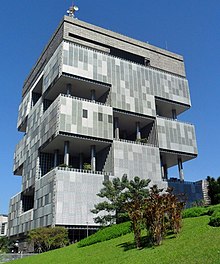

This article needs to be updated. The reason given is: Parts of the article are out dated by over a decade. (April 2024) |
Brazil is the 7th largest energy consumer in the world and the largest in South America.[1][2] At the same time, it is an important oil and gas producer in the region and the world's second largest ethanol fuel producer. The government agencies responsible for energy policy are the Ministry of Mines and Energy (MME), the National Council for Energy Policy (CNPE), the National Agency of Petroleum, Natural Gas and Biofuels (ANP) and the National Agency of Electricity (ANEEL).[3][4][5] State-owned companies Petrobras and Eletrobras are the major players in Brazil's energy sector, as well as Latin America's.[6]
- ^ "Primary energy consumption by country 2022". Statista. Retrieved 2024-01-17.
- ^ Pottmaier, D.; Melo, C. R.; Sartor, M. N.; Kuester, S.; Amadio, T. M.; Fernandes, C. A. H.; Marinha, D.; Alarcon, O. E. (2013-03-01). "The Brazilian energy matrix: From a materials science and engineering perspective". Renewable and Sustainable Energy Reviews. 19: 678–691. doi:10.1016/j.rser.2012.11.063. ISSN 1364-0321.
- ^ OECD/IEA. World Energy Outlook 2006. ISBN 92-64-10989-7
- ^ "Project Closing Report. Natural Gas Centre of Excellence Project. Narrative" (PDF). 20 March 2005. Archived from the original (PDF) on 2007-09-27. Retrieved 2007-05-12.
- ^ Cite error: The named reference
oecdwas invoked but never defined (see the help page). - ^ Silvestre, B. S., Dalcol, P. R. T. Geographical proximity and innovation: Evidences from the Campos Basin oil & gas industrial agglomeration — Brazil. Technovation (2009), doi:10.1016/j.technovation.2009.01.003
